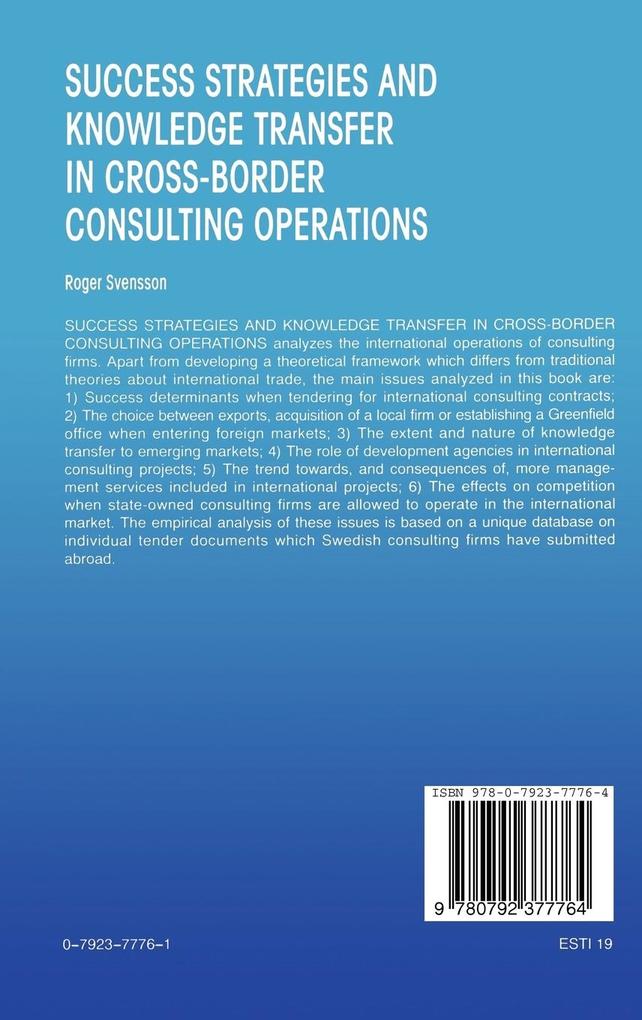
Zustellung: Mi, 23.07. - Mo, 28.07.
Versand in 2 Wochen
VersandkostenfreiSuccess Strategies and Knowledge Transfer in Cross-Border Consulting Operations analyzes the international operations of consulting firms. Apart from developing a theoretical framework which differs from traditional theories about international trade, the main issues analyzed in this book are: 1) Success determinants when tendering for international consulting contracts; 2) The choice between exports, acquisition of a local firm or establishing a greenfield office when entering foreign markets; 3) The extent and nature of knowledge transfer to emerging markets; 4) The role of development agencies in international consulting projects; 5) The trend towards, and consequences of, more management services included in international projects; 6) The effects on competition when state-owned consulting firms are allowed to operate in the international market. The empirical analysis of these issues is based on a unique database of individual tender documents which Swedish consulting firms have submitted abroad.
Inhaltsverzeichnis
1 Introduction. - 1. 1 The Consulting Sector Deserves more Attention. - 1. 2 The First Book about International Consulting Operations. - 1. 3 Unique Data on Tender Documents. - 1. 4 The Role of Consulting Firms and their Services. - 1. 5 Outline of the Book. - 2 Theoretical Framework. - 2. 1 The Nature of Consulting Services: Long-Term Relationships. - 2. 2 The Nature of Consulting Firms. - 2. 3 The Market Structure: Scope Economies. - 2. 4 The Customers: The Clients. - 3 International Consulting. - 3. 1 International versus Domestic Consulting. - 3. 2 The Demand Shock Theory. - 3. 3 The Entry Mode Choice by Nordic Consulting Firms. - 3. 4 Summary. - 4 Development Agencies, Clients and Consulting Firms. - 4. 1 The Role of Development Agencies. - 4. 2 Bilateral versus Multilateral Development Agencies. - 4. 3 Procurement Rules. - 4. 4 Summary. - 5 Knowledge Transfer. - 5. 1 Knowledge Transfer in the Consulting Sectors. - 5. 2 Organization Mode and Development Level. - 5. 3 Transfer through Training and Cooperation. - 5. 4 Summary. - 6 Success Factors when Tendering. - 6. 1 Alternative Tender Systems. - 6. 2 Competition Step 1: Prequalification and Invitation. - 6. 3 Competition Step 2: Tender Document and Final Selection. - 6. 4 Negotiated Contracts. - 6. 5 Summary. - 7 Management Services and State-Owned Consulting Firms. - 7. 1 Engineering versus Management Services. - 7. 2 Consequences of the Trend toward Management Services. - 7. 3 Privately Owned versus State-Owned Consulting Firms. - 7. 4 Predation by Putting Rivals at a Cost Disadvantage. - 7. 5 Consequences of the Exclusive Dealing Contract. - 7. 6 Summary. - 8 Success Strategies and Competitiveness in the Global Market. - 8. 1 Focus on Specific Host Countries. - 8. 2 The Modern Consulting Firm. - 8. 3 Typical Mistakes. - 8. 4 Cooperation with Contractors. - 8. 5 Government Assistance and Subsidies. - 8. 6 Swedish Consulting Firms and Multilateral Development Agencies. - 8. 7 Summary. - 9 Conclusions. - Append. - A Swedish and Nordic Consulting Exports. - A. 1 Databases and Sample Selection. - A. 2 History of Swedish Consulting Firms. - A. 3 Basic Statistics on Firms. - A. 4 Statistics on Sectors and Regions. - A. 5 Statistics on Tender Documents. - B Questionnaires. - B. 1 Questionnaire on Firms. - B. 2 Questionnaire on Proposals. - References. - Abbreviations.
Produktdetails
Erscheinungsdatum
29. Februar 2000
Sprache
englisch
Auflage
2000 edition
Seitenanzahl
204
Reihe
Economics of Science, Technology and Innovation
Autor/Autorin
Roger Svensson
Verlag/Hersteller
Produktart
gebunden
Abbildungen
XV, 204 p.
Gewicht
490 g
Größe (L/B/H)
234/156/14 mm
ISBN
9780792377764
Entdecken Sie mehr
Bewertungen
0 Bewertungen
Es wurden noch keine Bewertungen abgegeben. Schreiben Sie die erste Bewertung zu "Success Strategies and Knowledge Transfer in Cross-Border Consulting Operations" und helfen Sie damit anderen bei der Kaufentscheidung.








